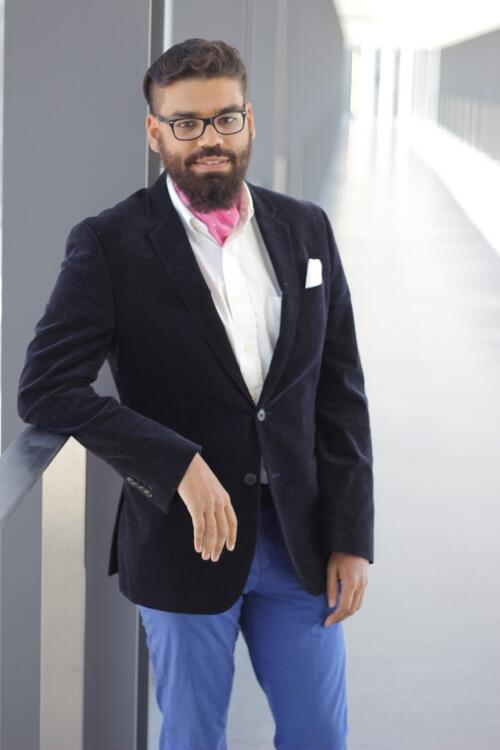
Canada’s best co-op student of the year
Third-year mechatronics engineering student Andrew Andrade, co-founder of a successful startup, is Canada's top co-op student of the year

Third-year mechatronics engineering student Andrew Andrade, co-founder of a successful startup, is Canada's top co-op student of the year
By Faculty of EngineeringAndrew Andrade was halfway around the world when the mechatronics engineering student discovered he had not only won Waterloo Engineering’s top co-op student award, but the national award as well.

Andrade was on an exchange term at the National University of Singapore in March 2015 when he received an email about the Faculty award and another one announcing he’d been chosen by the Canadian Association for Co-operative Education as Canada’s Best Co-Op Student of the Year and Emery-Dufault Award winner for 2014. The prestigious honours recognized his outstanding work term performance, along with other factors including community involvement, and contribution to co-op and academic achievement.
Andrade’s engineering co-op experience ranges from work terms spent at Suncor Energy Inc. in Calgary, to Facebook in California, to PetroPredict, a company he launched in 2014 along with recent Waterloo mechanical engineering graduate Dominic Toselli.
The idea to establish his own business was sparked by a talk given by Larry Smith, a University of Waterloo professor, who specializes in the forecasting and economics of innovation. Speaking about the advantages of the University’s co-op program, Smith emphasized the opportunities students have to develop an innovation solution for an industry challenge faced by workplace employers.
In tandem with Smith’s advice, Andrade used his knowledge of the problems in the production of oil and gas and combined that with some of the techniques and technologies he had gained exposure to while working at Facebook in Silicon Valley. The result was PetroPredict, which uses data analytics to enable oil companies to make better decisions for potential pipeline leaks that could cause environmental damage.
“We build tools that identify problems in the production of oil and gas to help engineers make better decisions,” says Andrade.
After reaching out and receiving initial positive feedback for PetroPredict from a number of industry experts, Andrade spent a work term in the Enterprise Co-op program working on his company. Run out of the Conrad Business, Entrepreneurship and Technology Centre, E Co-op enables students to start a business while earning a co-op credit.
“The business advice I’ve received along the way from people throughout the University has been invaluable,” he says. “Everyone I’ve spoken to about the company goes out of their way to help.”
The results of Andrade and Toselli’s efforts have paid off in a rewarding way. In 2014, PetroPredict won a pair of top awards at the Ontario Centres of Excellence Discovery Conference and captured several major awards from Velocity, the University of Waterloo’s startup incubator. The company also deployed its analytics solution to a multi-billion international oil company and has made research contributions to the application of artificial intelligence and predictive analytics in the petroleum industry.
A strong advocate for the Faculty’s co-op system, Andrade’s first work term experience was at a machine and tool company while he was still a high school student in Port Credit, ON. It was there he learned the basics of manufacturing, the resulting skills of which helped him land his university co-op positions.
Andrade regularly speaks about the benefits of a co-op education to audiences that include current Waterloo students and ones at his former high school. Not able to be there in person, he was Skyped in to Port Credit Secondary School while working at Facebook in California.
He is currently working on an online tutorial series called Petroleum101 with the University of Waterloo Society of Petroleum Engineers (SPE) student chapter. The tutorial series is intended to help educate students on the basics of the petroleum industry to both enable opportunities in the industry for co-op and for entrepreneurial innovations.
In September 2015, the University’s SPE student chapter will launch new Petroleum 101 content featuring multiple guest authors in the industry.
“Petroleum101 is written to provide young professionals the information they need to succeed in the industry,” explains Andrade. “As the world’s reliance on energy from petroleum continues in the foreseeable future, there is a greater number of opportunities both for employment and for innovations to ensure that petroleum production methods are sustainable and efficient while maintaining low environmental risk.”
Up next for the engineering student? Finishing his final year of school, which includes working as part of a team on a Capstone Design project to be showcased in March 2016. The multidisciplinary team consisting of mechatronics, mechanical and systems design engineering students is working on a stationary energy storage system that enables the sustainable and economical electrical storage for residential use. Although Andrade is keeping details of the project under wraps right now, based on his successful track record both inside and outside of the classroom there’s no doubt his project will capture attention.

Read more
How Doug Kavanagh’s software engineering degree laid the foundation for a thriving career in patient care

Read more
Upside Robotics secures new funding to accelerate the future of sustainable farming

Read more
Redefining capstone learning by bringing students, faculty and community partners together to tackle real-world challenges
The University of Waterloo acknowledges that much of our work takes place on the traditional territory of the Neutral, Anishinaabeg, and Haudenosaunee peoples. Our main campus is situated on the Haldimand Tract, the land granted to the Six Nations that includes six miles on each side of the Grand River. Our active work toward reconciliation takes place across our campuses through research, learning, teaching, and community building, and is co-ordinated within the Office of Indigenous Relations.